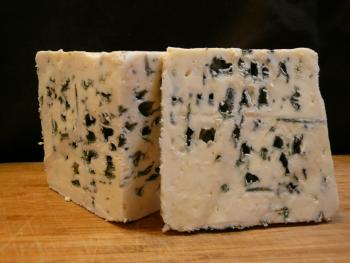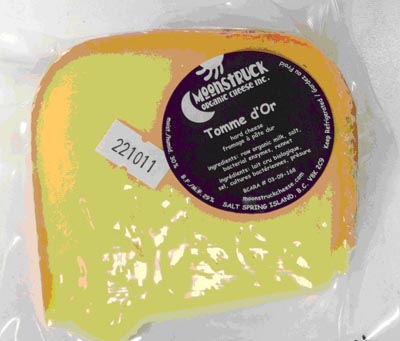A 74-year-old man has died and three others are seriously ill after consuming cheese or cottage cheese in Italy.
Something may have been lost in translation, but few other details were available.

A 74-year-old man has died and three others are seriously ill after consuming cheese or cottage cheese in Italy.
Something may have been lost in translation, but few other details were available.
A third person has died following a listeria outbreak linked to soft cheeses produced in the Australian state of Victoria.
Victoria’s acting chief health officer, Dr Michael Ackland, has confirmed the death of a 68-year-old New South Wales man in late January was linked to the listeria contamination of Jindi cheese products.
An 84-year-old Victorian man and a 44-year-old Tasmanian man have also died of listeria infection. A pregnant NSW woman miscarried. More than 20  other cases have been reported.
other cases have been reported.
Jindi has voluntarily recalled all batches of cheese manufactured up to January 6.
The Newcastle Herald cited Dr Ackland as saying the outbreak, which has been traced to the company’s factory in Gippsland, was the largest the nation had suffered and one of the most complex. He described the process of tracking the outbreak to Jindi as ”an important piece of investigative work”, which involved obtaining food histories from victims and intelligence from OzFoodNet, the federal food diseases surveillance unit, as well as bacterial DNA tests to determine the strain of listeria.
On January 7, Jindi’s French-owned parent company, Lactalis – which bought the gourmet cheese maker from Menora Foods in November for an estimated $20 million – voluntarily committed to a quality assurance program  that ”significantly cranks up” its existing food safety standards and has satisfied Victoria’s chief health officer.
that ”significantly cranks up” its existing food safety standards and has satisfied Victoria’s chief health officer.
Jindi’s chief executive, Franck Beaurain, has not returned telephone calls from Fairfax Media for more than a week.
Three more Australians have been stricken with listeriosis after eating soft cheese, bringing the total number of people affected nationwide to 21.
Two Australians have died and a pregnant woman has miscarried  following the outbreak.
following the outbreak.
The people ate cheese produced by the Jindi Cheese Company that has since been recalled.
Jindi has voluntarily recalled all batches of cheese manufactured up to and including January 6.
NSW Health acting director of health protection Professor Wayne Smith said all of the recent cases involved people aged over 65 with one person in a serious condition.
Consumers can call the Jindi helpline on 1800 680 175 for more information on the recalled cheeses.
Eight cases of listeria infection across Australia have found to be linked and a further three cases are under investigation.
Victoria’s chief health officer Rosemary Lester said consumers should discard 1kg brie and camembert cheese branded Jindi, the 1kg  Wattle Valley double brie and the 1kg Wattle Valley camembert with a best before date of December 21.
Wattle Valley double brie and the 1kg Wattle Valley camembert with a best before date of December 21.
Dr Lester warned consumers to check the best before date of any Jindi or Wattle Valley soft cheeses.
Two Victorians, three NSW residents and one person in Queensland, Tasmania and Western Australia have been diagnosed with the infection.
“Symptoms of illness can take up to 70 days to appear.”
Canadians have gone hardcore as notorious cheese smugglers.
NPR reports a “large scale Canada-U.S. cheese smuggling operation” has been brought down, after an international investigation tracked criminals who were skirting import duties and Canada’s higher cheese prices.
“The investigation revealed over $200,000 worth of cheese and other products were purchased and distributed for an estimated profit of over $165,000,” Niagara police  said.
said.
The smugglers — one current and one former police officer, and one civilian — reportedly sought out pizza restaurants to move their merchandise. News emerged this week that charges would soon be announced against what Mark called a “mozzarella mafia.”
As Windsor, Ontario, pizzeria owner Bob Abumeeiz told the CBC, he has been asked several times if he’s interested in buying cheese smuggled from America, where prices are anywhere from a third to half what they are in Canada.
“Cheese is the white gold in the restaurant business. Cheese is 50 percent of the taste on a pizza,” he said. “The price is rising every year two or three percent.”
The network operated in Ontario, where two of the accused have worked for the Niagara Regional Police Service.
Dischamp cheese has been linked to an outbreak of Salmonella Dublin that has sickened at least 48 people who purchased it at the Saint-Nectaire farmers market.
Lot number D21950033 is that of St. Nectaire farmer sold the cut between August 10 and  September 5. It represents 3,500 cheeses or 5 tons.
September 5. It represents 3,500 cheeses or 5 tons.
E. coli O26 has been found in Roquefort Designation of Origin (PDO) cheese sold under a dozen brands including La Petite Cave and Monoprix Gourmet, and withdrawn from sale.
The producer, Gabriel Coulet SA, based in Roquefort, said a check revealed E. coli O26:H11.  Consumers were asked to return the cheese.
Consumers were asked to return the cheese.
The bacteria was detected during internal testing by French retailer, Monoprix.
Federal authorities in Chicago have charged four people with distributing more than 100,000 pounds of tainted Mexican cheese they say the suspects would “wash” and resell after it was returned by customers because of mold or fungus.
U.S. Attorney Patrick Fitzgerald’s office said Thursday the four suspects would scrape the mold or fungus they could see and then resell it.
The Chicago Sun-Times reports the suspects tried to hide what they were doing by lying to inspectors from the federal Food and Drug Administration and sending false documents to the agency.
In all, more than 110,000 pounds of tainted Mexican cheese was shipped out in 2007, according to a six-count indictment returned Wednesday.
The indictment doesn’t allege any instances of illness or other public health consequences attributed to the cheese, though inspectors later determined samples of the cheese were contaminated with salmonella, E. coli and other illness-causing bacteria.
One defendant owned an Illinois company that imported the dried Mexican cheese, and another owned a Wisconsin company, which also had a facility in Elmhurst, that distributed the cheese nationwide.
The Wisconsin company distributed the cheese to retail stores in Illinois, Indiana, Michigan, Georgia and Texas under the brand name Queso Cincho De Guerrero.
A recall was issued in September 2007 for the dry, hard Mexican cheese, sold in 35- and 40-pound wheels.
The British Columbia Centre for Disease Control (BCCDC, that’s in Canada) is warning the public not to consume Tomme d’Or cheese manufactured by Moonstruck Organic Cheese located on Saltspring Island. Other types of cheeses produced by Moonstruck Organic Cheese are not affected by this advisory.
This health alert is the result of a routine sampling program by the BCCDC and further investigation by the manufacturer which revealed that samples of the finished products contained Listeria monocytogenes.  Affected products include all lot numbers of Tomme d’Or cheese. In order to ensure the health and safety of consumers, a photo of the product is provided below so the public can easily identify the product. The manufacturer is fully cooperating and assisting with the investigation.
Affected products include all lot numbers of Tomme d’Or cheese. In order to ensure the health and safety of consumers, a photo of the product is provided below so the public can easily identify the product. The manufacturer is fully cooperating and assisting with the investigation.
This product was sold at various retailers throughout British Columbia, and anyone who may have purchased this recalled cheese should not consume it, and discard or return it to their place of purchase. The BCCDC is concerned that this cheese product may still be in the homes of consumers as these cheeses can be stored and consumed well beyond the product’s best before date. Listeria, if present, will grow to high numbers even if the cheese has been stored in the refrigerator. Food contaminated with Listeria monocytogenes may not look or smell spoiled.
 Currently there are no illnesses linked to this product.
Currently there are no illnesses linked to this product.
Fall 2008 was a crappy time in Canada. While the Maple Leaf listeria-in-deli-meats outbreak would kill 23 and sicken 56, a listeria-in-cheese outbreak plagued Quebec (that’s in Canada, according to some), sickening lots, especially expectant mothers.
Amy was pregnant, heightening sensitivities.
At the time, public attention and concern in Quebec was far more focused on the plight of cheesemongers than the sick and several dead. Regulators took some tough steps to limit the outbreak but in a culture that values tradition, the Quebec Minister of Agriculture was forced to.jpeg) capitulate and change his tune from, "The province is not there to compensate. We aren’t an insurance company," to offering a three-year, $8.4-million aid package, along with $11.3-million in interest-free loans to Quebec’s small cheese producers and retailers less than three weeks later.
capitulate and change his tune from, "The province is not there to compensate. We aren’t an insurance company," to offering a three-year, $8.4-million aid package, along with $11.3-million in interest-free loans to Quebec’s small cheese producers and retailers less than three weeks later.
Government health-types in Quebec have now offered their version of events in the current issue of the Journal of Food Protection.
Although numbers of sick people were all over the place at the time, the researchers conclude there were 38 confirmed sick with the same strain of Listeria monocytogenes (LM P93) across Quebec from June through Dec. 2008, including 14 pregnant women and two babies born to asymptomatic mothers. There were two elderly deaths and three neonatal deaths.
The traceback of many brands of cheese that tested positive for LM P93 collected from retailers identified two cheese plants contaminated by L. monocytogenes strains on 3 and 4 September. PFGE profiles became available for both plants on 8 September, and confirmed that a single plant was associated with the outbreak. Products from these two plants were distributed to more than 300 retailers in the province, leading to extensive cross-contamination of retail stock.
So where is that local cheesemonger you know, trust and can look in the eye, getting their cheese from?
The abstract is below:
Widespread Listeriosis outbreak attributable to pasteurized cheese, which led to extensive cross-contamination affecting cheese retailers, Quebec, Canada, 2008
01.jan.12
Journal of Food Protection®, Volume 75, Number 1, January 2012 , pp. 71-78(8)
Gaulin, Colette; Ramsay, Danielle; Bekal, Sadjia
http://www.ingentaconnect.com/content/iafp/jfp/2012/00000075/00000001/art00011
Abstract:
A major Listeria monocytogenes outbreak occurred in the province of Quebec, Canada, in 2008, involving a strain of L. monocytogenes (LM P93) characterized by pulsed-field gel electrophoresis (PFGE) and associated with the consumption of pasteurized milk cheese. This report describes the results of the ensuing investigation. All individuals affected with LM P93 across the province were interviewed with a standardized questionnaire. Microbiological and environmental investigations were conducted by the Quebec’s Food Inspection Branch of Ministère de l’Agriculture, des Pêcheries et de l’Alimentation du Québec among retailers and cheese plants involved in the outbreak. Between 8 June and 31 December 2008, 38 confirmed cases of LM P93 were reported to public health authorities, including 16 maternal-neonatal cases (14 pregnant women, and two babies born to asymptomatic mothers). The traceback of many brands of cheese that tested positive for LM P93 collected from retailers identified two cheese plants contaminated by L. monocytogenes strains on 3 and 4 September. PFGE profiles became available for both plants on 8 September, and confirmed that a single plant was associated with the outbreak. Products from these two plants were .jpeg) distributed to more than 300 retailers in the province, leading to extensive cross-contamination of retail stock. L. monocytogenes is ubiquitous, and contamination can occur subsequent to heat treatment, which usually precedes cheese production. Contaminated soft-textured cheese is particularly prone to bacterial growth. Ongoing regulatory and industry efforts are needed to decrease the presence of Listeria in foods, including pasteurized products. Retailers should be instructed about the risk of cross-contamination, even with soft pasteurized cheese and apply methods to avoid it.
distributed to more than 300 retailers in the province, leading to extensive cross-contamination of retail stock. L. monocytogenes is ubiquitous, and contamination can occur subsequent to heat treatment, which usually precedes cheese production. Contaminated soft-textured cheese is particularly prone to bacterial growth. Ongoing regulatory and industry efforts are needed to decrease the presence of Listeria in foods, including pasteurized products. Retailers should be instructed about the risk of cross-contamination, even with soft pasteurized cheese and apply methods to avoid it.